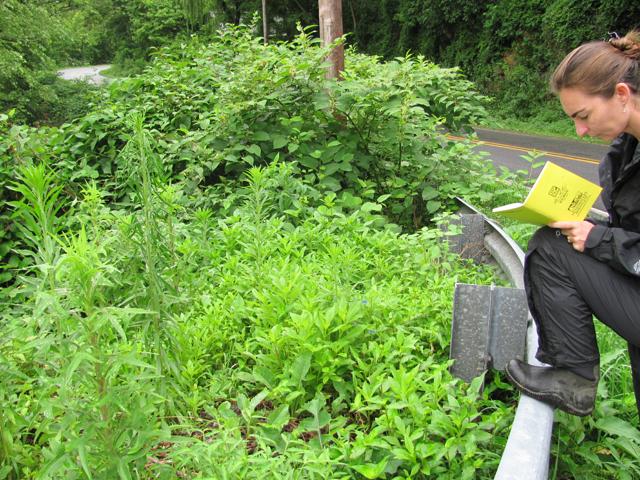Every once in awhile, the perfect volunteer for a particular job shows up just when you need her. Such was the case with Corinne Duncan. RiverLink relies on a host of dedicated volunteers, but Duncan, who studied environmental science and rangeland ecology at Oregon State University, is a plant ecologist who knows how to eradicate weeds. Maybe not rid the world of them permanently, but at least seriously thin the ranks.
Having resolved to leave Oregon, Duncan and her husband — like many Asheville transplants — set about researching where they ought to go. It won’t surprise those of us who already live here that the couple chose Asheville. But for Duncan, it had less to do with great restaurants and an eclectic downtown than with Western North Carolina’s extraordinary plant diversity.
In Oregon, she worked with the Institute for Applied Ecology on a project to re-establish Nelson's checker-mallow, a lovely but threatened pink wildflower. At 20 sites in the Willamette Valley, Duncan and her co-workers planted 40,000 propagules and 180 pounds of Nelson's checker-mallow seed. They then began the tedious, ongoing task of following these seedlings. Duncan also took part in a study of the Western juniper, a native woody plant that’s become invasive there, shading out perennials that stabilized certain wilderness areas.
Arriving in Asheville, Duncan wanted to continue the same type of work: eradicating invasive plants and reinstating or protecting native species. Exploring local nonprofits, she discovered RiverLink. "I liked their focus of ‘live, work, play,’ and the fact that this was an urban project, an area I hadn’t worked in before," she explains.
Duncan says her lucky day was when she took one of the nonprofit’s regular bus tours, because her tour guide was Karen Cragnolin, the group’s executive director. "Cragnolin has a wealth of knowledge of the natural history of this place," notes Duncan, who began volunteering two days a week. Her first job was producing a management plan for getting rid of the Japanese knotweed on the Sculpture Plaza, a future park.
This led to Duncan's involvement with the nonprofit’s 24 conservation easements — properties that can’t be developed, but that RiverLink will maintain. Duncan reports on the plant life on the easements (both invasive and native), giving landowners suggestions on ways to improve these areas.
Her latest project, titled “Guide to Control Methods for 10 Common Western North Carolina Riparian Weeds,” targets smaller landowners (see box). Duncan says she wrote it to help RiverLink and local landowners while educating herself about the plant species here, though "Oregon has most of these weeds, too," she notes.
WNC gardeners will recognize most of the names, having chopped, burned, sprayed and pulled many of these weeds themselves. English ivy, Japanese knotweed, kudzu, Chinese privet, and Oriental bittersweet made the list, as did the lesser-known tree of heaven.
Duncan's focus is simple: Destroy the roots, interrupt reproduction, and you can destroy the weeds. The guide gives specifics on how to do just that, but it’s crucial that you follow Duncan's instructions precisely.
"Japanese knotweed,” she warns, “has hollow stems that can float downstream and begin to colonize elsewhere," so proper cleanup and disposal are key. In some cases, keeping the yanked plants till they’re utterly desiccated is best: Some species can propagate from any part of the stem. The guide takes you through the plants’ entire life cycle, noting the best times to spray herbicides (which she cautiously endorses) and pull the weeds. A description and picture of each plant makes for easier identification.
Still, the mere idea that there could be a way to rid ourselves of these nasty intruders is enough to make a gardener want to rush out and start pulling them up by the roots, screaming, “Die, roots, die!”
— Cinthia Milner gardens in Leicester.




Before you comment
The comments section is here to provide a platform for civil dialogue on the issues we face together as a local community. Xpress is committed to offering this platform for all voices, but when the tone of the discussion gets nasty or strays off topic, we believe many people choose not to participate. Xpress editors are determined to moderate comments to ensure a constructive interchange is maintained. All comments judged not to be in keeping with the spirit of civil discourse will be removed and repeat violators will be banned. See here for our terms of service. Thank you for being part of this effort to promote respectful discussion.